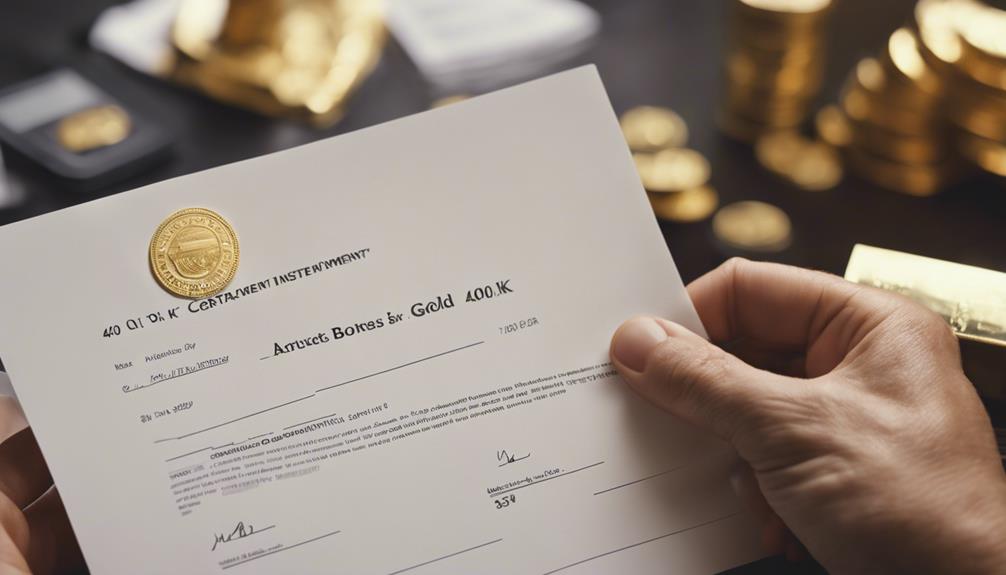Investing in a gold IRA involves risks you should consider carefully. Gold prices are highly volatile, driven by market sentiment and economic factors, which can impact your retirement savings unexpectedly. You won’t earn dividends or interest, so your returns depend solely on price appreciation. Storage costs and security concerns add ongoing fees, and strict IRS rules limit eligible gold types. To fully protect your investments, understanding these downsides is essential—more details await if you keep exploring.
Key Takeaways
- Gold IRAs are vulnerable to market volatility, causing unpredictable short-term value fluctuations.
- They do not generate income, relying solely on potential price appreciation for returns.
- Storage and insurance costs can significantly reduce overall investment gains.
- Security risks include theft, loss, or damage if custodial storage protocols are inadequate.
- Regulatory compliance is complex, with strict IRS rules governing eligible gold products and account management.

Are you considering diversifying your retirement savings? If so, a Gold IRA might seem like a(n) attractive option, offering a hedge against economic downturns and currency fluctuations. However, before you commit, it’s essential to understand the potential risks and downsides. One major concern is market volatility. While gold has historically been seen as a safe haven, its prices can still swing considerably in short periods. This volatility can impact the value of your IRA, especially if you need to access your funds during a dip. Unlike traditional investments, gold doesn’t generate income like dividends or interest, so its value depends solely on market sentiment and demand. During times of economic uncertainty, gold prices may soar, but in calmer times, they can stagnate or even decline. This unpredictability can make it challenging to plan for retirement and may lead to unexpected shortfalls if the market moves unfavorably.
Another critical issue is storage costs. Unlike stocks or bonds stored electronically, physical gold requires secure storage, which comes at a price. Most custodians charge fees for safekeeping, insurance, and handling. These costs can add up over time, eating into your investment returns. If you’re not careful, high storage fees may diminish the benefits of holding gold in your IRA, especially if gold prices don’t perform as expected. Additionally, not all custodians have the same fee structures, so you need to shop around and understand what you’re paying before investing. The logistics of storage also pose risks; you must trust that your custodian will handle your gold securely and ethically. Any mishandling or security breach could jeopardize your investment. Moreover, the integration of AI technology in managing storage and security systems is increasingly influencing the safety and efficiency of gold storage solutions.
Furthermore, there are regulatory and IRS considerations. Not all gold products qualify for inclusion in a Gold IRA, and strict rules govern the types and purity of gold you can hold. If you accidentally invest in non-compliant gold, you risk penalties and losing the tax-advantaged status of your IRA. Plus, dealing with specialized custodians and complying with IRS rules can be complex and time-consuming, requiring diligent oversight on your part.
Frequently Asked Questions
Can I Convert My Existing Retirement Account Into a Gold IRA?
Yes, you can convert your existing retirement account into a gold IRA through a retirement rollover. You’ll need to initiate an account conversion by contacting your current provider and a gold IRA custodian. They’ll guide you through the process, ensuring the transfer is tax-advantaged and compliant. Keep in mind, proper handling of the rollover is essential to avoid penalties, so review all options carefully before proceeding with your account conversion.
What Are the Tax Implications of Withdrawing From a Gold IRA Early?
Breaking the bank isn’t worth it when you withdraw early from a gold IRA. You’ll face hefty early withdrawal penalties and must navigate tax reporting requirements, which can complicate your finances. The IRS treats your withdrawal as a taxable event, often leading to income taxes on the amount. To avoid surprises, consider the long-term impact before taking money out early, as it can profoundly dent your retirement savings.
How Do I Choose a Reputable Gold IRA Custodian?
To choose a reputable gold IRA custodian, start by researching their reputation in gold storage and customer reviews. Look for a custodian with a solid track record, transparent fees, and strong industry credentials. You want someone who prioritizes secure storage of your gold and provides clear communication. Ask for references, verify their licensing, and compare their services with others to guarantee you’re selecting a trustworthy partner for your investment.
Are There Any Restrictions on the Types of Gold I Can Hold?
Can you really hold just any gold in your IRA? Not quite. You must adhere to strict standards—your gold needs at least 99.5% purity and must meet storage requirements. Think of it as a gatekeeper—only allowing certain types through. Coins and bars that meet these criteria, like American Gold Eagles or certain rounds, qualify. So, confirm your gold aligns with these rules to keep your IRA compliant and secure.
What Fees Are Typically Associated With Setting up a Gold IRA?
When setting up a gold IRA, you’ll encounter setup costs and ongoing storage fees. Setup costs typically cover account establishment and administrative fees, which can vary. Storage fees are charged for securely storing your gold with a custodian, often billed annually. Be sure to compare providers, as fees can differ markedly. Understanding these costs upfront helps you plan your investment and avoid surprises later.
Conclusion
While Gold IRAs may seem like a shining beacon of security, they come with hidden shadows lurking beneath. You need to weigh the risks carefully, as they can be as unpredictable as the stock market’s stormy seas. Remember, no investment is foolproof. By understanding the downsides, you steer your financial ship with clearer eyes, charting the waters of retirement planning wisely. Don’t let the glitter blind you—look beyond the surface before making your move.









